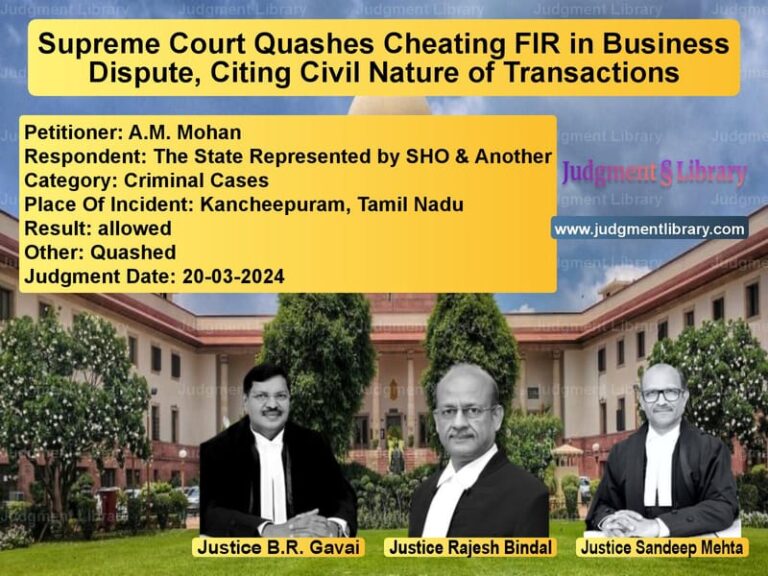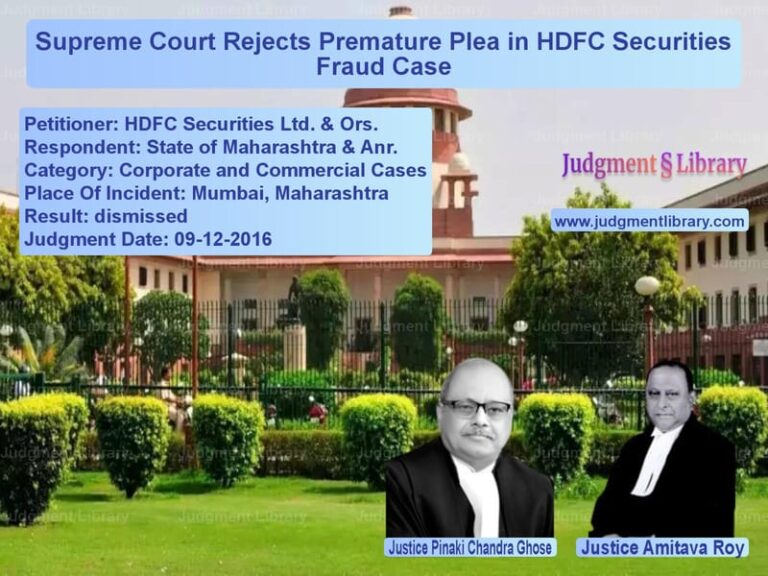Specific Performance and Merger Doctrine: Supreme Court Upholds Property Sale Execution
The Supreme Court, in Balbir Singh & Anr. v. Baldev Singh (D) Through His LRs & Ors., delivered a significant ruling affirming the principles of specific performance in property transactions and the doctrine of merger in appellate decisions. The judgment upholds a long-standing property transaction, resolving disputes over sale consideration deposits and the right to rescind a contract after appellate adjudication.
Background of the Case
The case involved a series of legal battles regarding the specific performance of agreements to sell property. The trial court had decreed four suits for specific performance in favor of the plaintiff on August 16, 1994. The decrees required the plaintiff to deposit the balance sale consideration within 20 days, with the defendants obligated to execute the sale deed.
Key Events
- The trial court decreed specific performance on August 16, 1994, requiring the plaintiff to deposit the balance sale consideration within 20 days.
- The first appellate court reversed the trial court’s decision on November 24, 1994, setting aside the decree for specific performance.
- The High Court restored the trial court’s decree in favor of the plaintiff in May 2018.
- The plaintiff sought execution of the decree in September 2018 and deposited the sale consideration as per court directives.
- The defendants challenged the execution, arguing that the plaintiff failed to deposit the sale consideration within 20 days as per the original decree.
- The High Court ruled against the defendants, prompting their appeal to the Supreme Court.
Key Legal Issues
Defendants’ Arguments
The defendants contended that:
- The plaintiff failed to comply with the trial court’s directive to deposit the balance sale consideration within 20 days.
- The High Court, in restoring the trial court’s decree, did not extend the time for deposit.
- The doctrine of merger should not apply to revive an extinguished obligation.
- The trial court’s decree should be rescinded under Section 28 of the Specific Relief Act, 1963.
Respondents’ (Plaintiffs’) Arguments
The plaintiffs contended that:
- The delay in depositing the balance sale consideration was due to the appellate litigation.
- The High Court’s judgment did not impose a fresh deadline, and the execution was lawfully sought.
- The doctrine of merger applied, meaning the original decree’s obligations merged into the appellate court’s ruling.
- The defendants’ challenge was an attempt to evade their contractual obligations.
Supreme Court’s Analysis
Doctrine of Merger
The Court reaffirmed that when an appellate court affirms or modifies a trial court’s decision, the original decree merges into the appellate ruling:
- “The doctrine of merger is founded on the rationale that there cannot be more than one operative decree at a given point of time.”
- “Once the High Court allowed the second appeals in favor of the plaintiffs, the trial court’s decree merged with the High Court’s decision.”
- The merger principle applies regardless of whether the appellate court modifies, reverses, or affirms the lower court’s ruling.
Applicability of Section 28 of the Specific Relief Act
The Supreme Court rejected the defendants’ argument that the contract should be rescinded due to non-deposit of the balance sale consideration:
- “The power under Section 28 is discretionary, and courts do not automatically annul a decree for specific performance.”
- “The decree does not cease to exist if the deposit is delayed due to appellate proceedings.”
- The trial court retains jurisdiction over specific performance decrees, even after issuance.
Time Extension in Conditional Decrees
The Court emphasized that time extension in specific performance cases must be assessed based on factual considerations:
- “The decree holders immediately moved the executing court upon High Court affirmation and deposited the sale consideration.”
- “A conditional decree requiring deposit within 20 days does not remain binding after an appellate modification.”
- “The executing court correctly permitted deposit and rejected rescission claims.”
Precedents Cited
The Court cited several cases to support its findings:
- Kunhayammed v. State of Kerala (2000) 6 SCC 359: Affirmed the doctrine of merger and its applicability in appellate rulings.
- Chandi Prasad v. Jagdish Prasad (2004) 8 SCC 724: Held that once an appellate court rules, the original decree ceases to operate independently.
- Bhupinder Kumar v. Angrej Singh (2009) 8 SCC 766: Clarified that execution courts can extend time for compliance.
Final Judgment
- The Supreme Court dismissed the appeals of the defendants.
- The execution of the property sale was upheld as valid.
- The Court ruled that rescission under Section 28 was not justified.
- The High Court’s decision permitting execution was affirmed.
Implications of the Judgment
This ruling has far-reaching consequences for property transactions and specific performance cases:
1. Strengthening of Specific Performance Decrees
Courts will prioritize enforcement of contractual obligations rather than rescinding decrees based on technical delays.
2. Clarity on Merger Doctrine
Appellate rulings replace trial court decisions, and litigants must comply with the final judgment rather than relying on earlier decrees.
3. Limited Scope for Rescission
Rescission under Section 28 will be restricted to cases where delay is unreasonable or intentional.
4. Fairness in Time Extensions
Courts retain discretion to extend deadlines in conditional decrees, preventing unfair dismissal of execution claims.
This landmark judgment reinforces judicial commitment to upholding contractual obligations while ensuring procedural fairness in property transactions.
Petitioner Name: Balbir Singh & Anr..Respondent Name: Baldev Singh (D) Through His LRs & Ors..Judgment By: Justice J.B. Pardiwala, Justice R. Mahadevan.Place Of Incident: Punjab & Haryana.Judgment Date: 17-01-2025.
Don’t miss out on the full details! Download the complete judgment in PDF format below and gain valuable insights instantly!
Download Judgment: balbir-singh-&-anr.-vs-baldev-singh-(d)-thr-supreme-court-of-india-judgment-dated-17-01-2025.pdf
Directly Download Judgment: Directly download this Judgment
See all petitions in Specific Performance
See all petitions in Contract Disputes
See all petitions in Property Disputes
See all petitions in Judgment by J.B. Pardiwala
See all petitions in Judgment by R. Mahadevan
See all petitions in dismissed
See all petitions in supreme court of India judgments January 2025
See all petitions in 2025 judgments
See all posts in Civil Cases Category
See all allowed petitions in Civil Cases Category
See all Dismissed petitions in Civil Cases Category
See all partially allowed petitions in Civil Cases Category







